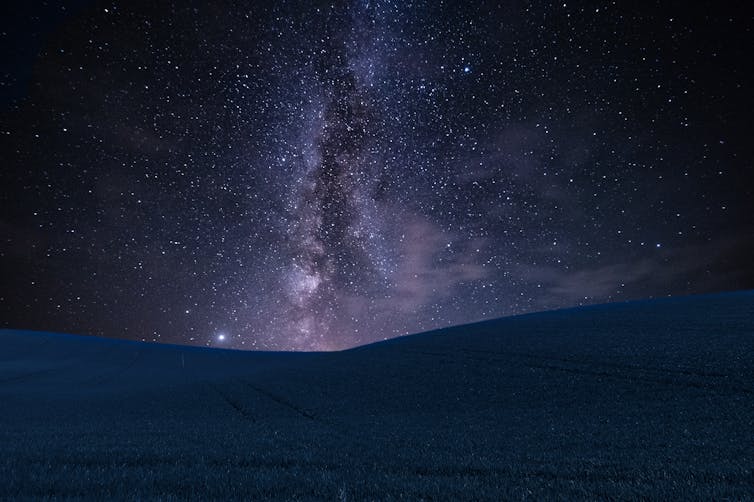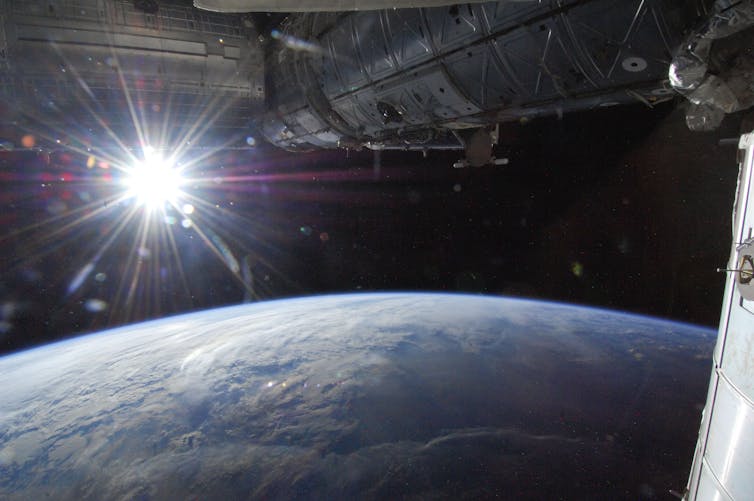Source: The Conversation (Au and NZ) – By Hannah Schunker, Lecturer of Physics, University of Newcastle

Bruno Gilli/ESO/Wiki Commons, CC BY-SA
Why do we see the sky during the day, but the galaxy at night? — Gary, age 9, Auckland
Hi Gary! Thank you for this great question.
To put it simply, the reason the sky looks different to us between daytime and nighttime is mostly because of our atmosphere.
The atmosphere surrounds Earth, and extends from the ground to outer space. It’s made of different gases including oxygen (which keeps us alive as we breathe it in), carbon dioxide (which we breathe out), methane (which is also in our farts), nitrogen and argon.
All these gases, as well as all solids and liquids, are made of molecules. Molecules are collections of atoms which are much too small for us to see, but are the basic building blocks of everything that exists. Importantly, different molecules have different combinations of atoms and come in different sizes.
A molecule’s size plays a role in how the molecule interacts with light. Light from the Sun isn’t one colour — it’s made up of all the colours of the rainbow (which is why we see a rainbow when light behaves in a certain way).
Some of the molecules in Earth’s atmosphere are just the right size that the blue part of the light from the Sun bounces off them, scattering in different directions.
So when we look towards the Sun during the day (remembering that you should never look directly at the Sun), we see rays of light that have come from the Sun straight down to us.
But when we look away from the Sun we see the blue light rays scattering from the part of the atmosphere we are looking at. That’s why the sky is so bright — and blue — during the day.
The galaxy at night
At night we see stars in a dark sky, and these stars make up our galaxy, the Milky Way. The Milky Way is made of a huge number of stars, including the Sun.

Shutterstock
Compared with other stars, the Sun actually isn’t that bright, but it looks very bright to us because it’s much closer to Earth than other stars are.
At night, when your side of Earth is facing away from the Sun, the only light that reaches you is from other stars. This starlight also scatters off molecules in the atmosphere, but as there’s less of it, not much scattering goes on.
This is why, at night when we’re facing away from the Sun, we don’t see the same thing as when we are facing the Sun during the day. Instead, we can look through the atmosphere and beyond at the big, dark expanse of space around us and the many, many faraway stars in our galaxy.
Read more:
Curious Kids: how does the Sun make such pretty colours at sunsets and sunrises?
The sky on other planets
Other planets in our Solar System have different molecules in their atmosphere compared with Earth, which means their skies look different during the day and night.
The atmosphere on Venus, for example, is so thick you would never see the Sun — not even during the day when you were facing towards it. The stars are not visible at night, either.
Astronauts who are above our atmosphere, such as on the International Space Station or on the Moon, don’t see the bright blue sky we see on Earth. Instead, they see the Sun as a large nearby star against a black sky.
And they can see the galaxy all the time.

NASA
![]()
The authors do not work for, consult, own shares in or receive funding from any company or organisation that would benefit from this article, and have disclosed no relevant affiliations beyond their academic appointment.
– ref. Curious Kids: why do we see the ‘sky’ during the day, but the galaxy at night? – https://theconversation.com/curious-kids-why-do-we-see-the-sky-during-the-day-but-the-galaxy-at-night-170096








